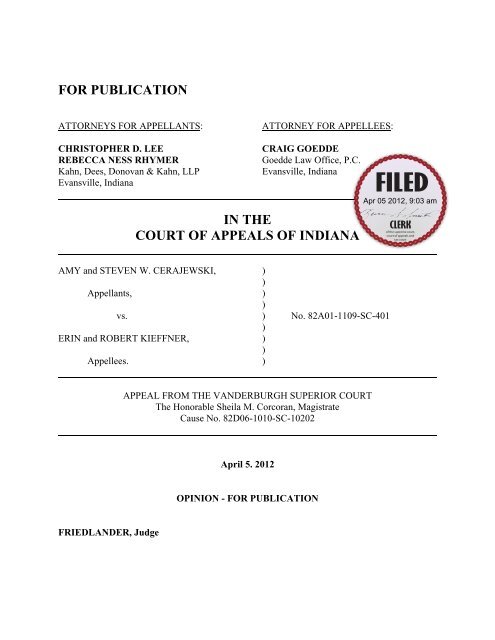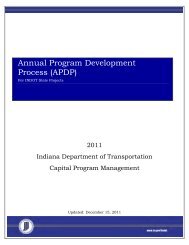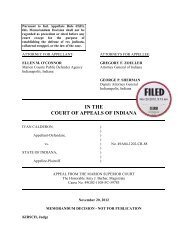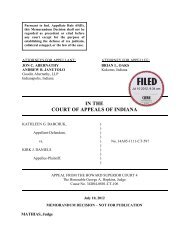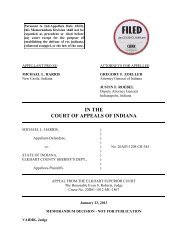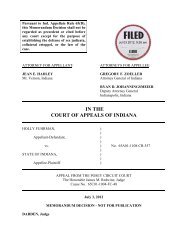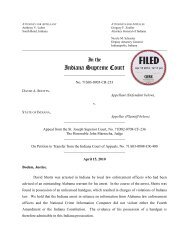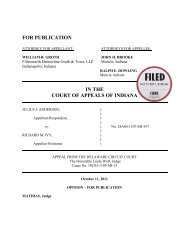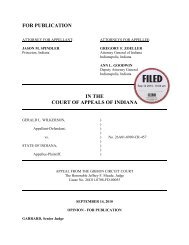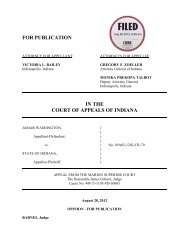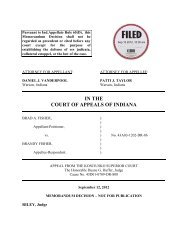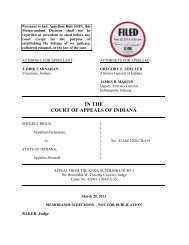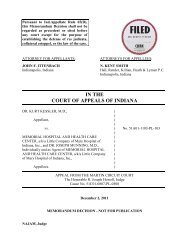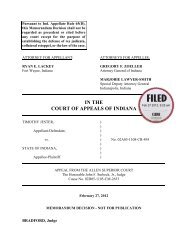Amy and Steven Cerajewski v. Erin and Robert ... - State of Indiana
Amy and Steven Cerajewski v. Erin and Robert ... - State of Indiana
Amy and Steven Cerajewski v. Erin and Robert ... - State of Indiana
Create successful ePaper yourself
Turn your PDF publications into a flip-book with our unique Google optimized e-Paper software.
FOR PUBLICATION<br />
ATTORNEYS FOR APPELLANTS:<br />
CHRISTOPHER D. LEE<br />
REBECCA NESS RHYMER<br />
Kahn, Dees, Donovan & Kahn, LLP<br />
Evansville, <strong>Indiana</strong><br />
ATTORNEY FOR APPELLEES:<br />
CRAIG GOEDDE<br />
Goedde Law Office, P.C.<br />
Evansville, <strong>Indiana</strong><br />
IN THE<br />
COURT OF APPEALS OF INDIANA<br />
AMY <strong>and</strong> STEVEN W. CERAJEWSKI, )<br />
)<br />
Appellants, )<br />
)<br />
vs. ) No. 82A01-1109-SC-401<br />
)<br />
ERIN <strong>and</strong> ROBERT KIEFFNER, )<br />
)<br />
Appellees. )<br />
APPEAL FROM THE VANDERBURGH SUPERIOR COURT<br />
The Honorable Sheila M. Corcoran, Magistrate<br />
Cause No. 82D06-1010-SC-10202<br />
April 5. 2012<br />
OPINION - FOR PUBLICATION<br />
FRIEDLANDER, Judge
<strong>Steven</strong> <strong>and</strong> <strong>Amy</strong> <strong>Cerajewski</strong> 1 bring this interlocutory appeal <strong>of</strong> the V<strong>and</strong>erburgh<br />
County small claims court’s denial <strong>of</strong> their motion to correct venue.<br />
We dismiss.<br />
On or about March 6, 2010, the <strong>Cerajewski</strong>s, as sellers, <strong>and</strong> <strong>Robert</strong> <strong>and</strong> <strong>Erin</strong> Kieffner,<br />
as buyers, entered into a purchase agreement for the sale <strong>of</strong> a home located in Posey County,<br />
<strong>Indiana</strong> (the Real Estate). Although <strong>Erin</strong> was, <strong>of</strong> the four, apparently the only resident <strong>of</strong><br />
V<strong>and</strong>erburgh County at the time, both parties enlisted the services <strong>of</strong> real estate agents out <strong>of</strong><br />
V<strong>and</strong>erburgh County. Closing for the Real Estate took place on or about May 12, 2010, 2 <strong>and</strong><br />
the Kieffners assumed possession on or about May 21, 2010. Thereafter, the <strong>Cerajewski</strong>s<br />
moved to Michigan, <strong>and</strong> the Kieffners moved to the Real Estate in Posey County.<br />
On October 13, 2010, the Kieffners filed the instant small claims action in<br />
V<strong>and</strong>erburgh County, alleging breach <strong>of</strong> contract <strong>and</strong> fraud resulting from the transaction for<br />
the sale <strong>of</strong> the Real Estate. The <strong>Cerajewski</strong>s appeared by phone <strong>and</strong> subsequently, on<br />
January 10, 2011, filed a motion to transfer venue, relying upon Trial Rule 75 <strong>and</strong> arguing<br />
that V<strong>and</strong>erburgh County was not a preferred venue for this action. On January 12, the small<br />
claims court set the matter for trial on March 29 <strong>and</strong> noted that the <strong>Cerajewski</strong>s’ motion to<br />
1<br />
The appellants’ last name was improperly captioned as “Cerojewski” at the trial court level but has been<br />
changed on appeal to reflect the proper spelling.<br />
2<br />
In conjunction with the Kieffners’ appellate brief, they filed an appendix containing the affidavit <strong>of</strong> <strong>Erin</strong><br />
Kieffner. In said affidavit, <strong>Erin</strong> averred that the closing took place in V<strong>and</strong>erburgh County. Though certainly<br />
relevant to the issue at h<strong>and</strong>, we observe that this evidence was not presented below. Therefore, it is not<br />
properly before us <strong>and</strong> will not be considered in this appeal. See generally Ind. Appellate Rule 50(A)(1)<br />
(purpose <strong>of</strong> an appendix is to include those parts <strong>of</strong> the record on appeal that are necessary for the appellate<br />
court to decide the issues presented). In further proceedings, however, the Kieffners would be well advised to<br />
introduce said evidence. Finally, we observe that the Kieffners’ request for attorney fees pursuant to Ind.<br />
Appellate Rule 66(E) is based entirely upon the “facts” supplied in their appendix, which we cannot consider.<br />
2
transfer was taken under advisement. Thereafter, on February 4, <strong>Steven</strong> <strong>Cerajewski</strong><br />
telephoned the court, <strong>and</strong> court personnel once again advised him <strong>of</strong> the trial date <strong>and</strong> that the<br />
motion to transfer had been taken under advisement. The day before the scheduled trial, the<br />
<strong>Cerajewski</strong>s filed a motion to order plaintiffs’ payment <strong>of</strong> filing costs for refiling case in<br />
defendants’ county <strong>of</strong> residence.<br />
The <strong>Cerajewski</strong>s did not appear on the March 29 trial date. <strong>Robert</strong> Kieffner appeared<br />
in person <strong>and</strong> by counsel <strong>and</strong> presented evidence in support <strong>of</strong> the Kieffners’ claim.<br />
Accordingly, the small claims court entered a default judgment against the <strong>Cerajewski</strong>s in the<br />
amount <strong>of</strong> $1250 plus costs, interest, <strong>and</strong> attorney fees.<br />
On April 29, 2011, the <strong>Cerajewski</strong>s filed a motion to correct error, or in the<br />
alternative, motion for relief from default judgment. The small claims court held a hearing<br />
on the motion on July 12, 2011, at which the <strong>Cerajewski</strong>s asked the court to set aside the<br />
default judgment <strong>and</strong> transfer venue from V<strong>and</strong>erburgh County. With respect to venue, both<br />
parties asserted arguments based upon T.R. 75, although the <strong>Cerajewski</strong>s’ counsel did (for<br />
the first time) briefly address Ind. Small Claims Rule 12. On July 22, the small claims court<br />
issued an order denying the <strong>Cerajewski</strong>s’ motion. As part <strong>of</strong> its written order, the court<br />
stated: “V<strong>and</strong>erburgh County is a county <strong>of</strong> preferred venue under Trial Rule 75 for the<br />
reason that Plaintiff <strong>Erin</strong> Kieffner was a resident <strong>of</strong> V<strong>and</strong>erburgh County, <strong>Indiana</strong> during the<br />
time the cause <strong>of</strong> action arose”. Appellants’ Appendix at 9.<br />
On August 2, 2011, the <strong>Cerajewski</strong>s filed a motion for the small claims court to<br />
reconsider its decision to refuse to set aside the default judgment <strong>and</strong> to transfer venue. In<br />
their motion, the <strong>Cerajewski</strong>s referred specifically to S.C.R. 12 when addressing their venue<br />
3
argument. The small claims court granted the motion to reconsider with respect to the default<br />
judgment only. Accordingly, the court vacated the entry <strong>of</strong> default on August 10, 2011. The<br />
court, however, refused to transfer venue to Posey County.<br />
On September 9, 2011, the <strong>Cerajewski</strong>s initiated this interlocutory appeal to obtain<br />
review <strong>of</strong> the small claims court’s venue determination only. We note that the <strong>Cerajewski</strong>s<br />
did not request certification <strong>of</strong> the order from the trial court nor seek acceptance <strong>of</strong><br />
jurisdiction from this court. Rather, they proceed as if this is an interlocutory appeal as a<br />
matter <strong>of</strong> right under Ind. Appellate Rule 14(A). It is not.<br />
App. R. 14(A) sets forth the exclusive list <strong>of</strong> interlocutory orders that may be appealed<br />
as a matter <strong>of</strong> right by the filing <strong>of</strong> a notice <strong>of</strong> appeal within thirty days <strong>of</strong> the entry <strong>of</strong> the<br />
interlocutory order:<br />
(1) For the payment <strong>of</strong> money;<br />
(2) To compel the execution <strong>of</strong> any document;<br />
(3) To compel the delivery or assignment <strong>of</strong> any securities, evidence <strong>of</strong><br />
debt, documents or things in action;<br />
(4) For the sale or delivery <strong>of</strong> the possession <strong>of</strong> real property;<br />
(5) Granting or refusing to grant, dissolving, or refusing to dissolve a<br />
preliminary injunction;<br />
(6) Appointing or refusing to appoint a receiver, or revoking or refusing to<br />
revoke the appointment <strong>of</strong> a receiver;<br />
(7) For a writ <strong>of</strong> habeas corpus not otherwise authorized to be taken<br />
directly to the Supreme Court;<br />
(8) Transferring or refusing to transfer a case under Trial Rule 75; <strong>and</strong><br />
4
(9) Issued by an Administrative Agency that by statute is expressly<br />
required to be appealed as a m<strong>and</strong>atory interlocutory appeal.<br />
Id. (emphasis supplied). See also Rowe v. Ind. Dep’t <strong>of</strong> Correction, 940 N.E.2d 1218 (Ind.<br />
Ct. App. 2011), trans. denied.<br />
We may dismiss appeals sua sponte upon discovering that we do not have jurisdiction.<br />
Moser v. Moser, 838 N.E.2d 532 (Ind. Ct. App. 2005), trans. denied. An appeal from an<br />
interlocutory order, as in the instant case, is not allowed unless specific authority is granted<br />
by the <strong>Indiana</strong> Constitution, statutes, or the rules <strong>of</strong> court. Id. Moreover, any such express<br />
authorization is strictly construed. Id.<br />
In the instant case, the <strong>Cerajewski</strong>s rely upon App. R. 14(A)(8) in pursuing this<br />
interlocutory appeal as a matter <strong>of</strong> right. Under that provision, a party may immediately<br />
appeal an order refusing to transfer a case under T.R. 75. At first blush, one could argue that<br />
is the precise order being appealed here, as the parties <strong>and</strong> the trial court all discussed<br />
preferred venue requirements under T.R. 75.<br />
The reality, however, is that T.R. 75 is inapplicable. It is well established that venue<br />
in small claims proceedings is not governed by T.R. 75 “but rather is governed exclusively<br />
by <strong>Indiana</strong> Small Claims Rule 12.” Dreyer & Reinbold, Inc. v. Leib, 811 N.E.2d 858, 861<br />
(Ind. Ct. App. 2004). S.C.R. 12 provides in pertinent part:<br />
(A) Proper Venue. Proper venue for a case filed in the small claims docket <strong>of</strong><br />
a Circuit, Superior, or County Court shall be in the county where the<br />
transaction or occurrence actually took place or where the obligation was<br />
incurred or is to be performed, or where one <strong>of</strong> the defendants resides or has<br />
his or her place <strong>of</strong> employment at the time the complaint is filed.<br />
* * * *<br />
(B) Motion to Correct Venue. When it appears that the county in which the<br />
5
action is pending is not the proper place for the hearing <strong>of</strong> such action, the<br />
court shall, on the motion <strong>of</strong> a party or upon its own motion, determine the<br />
correctness <strong>of</strong> the venue. If the venue is incorrect the judge shall, at the option<br />
<strong>of</strong> the plaintiff, order the action to be transferred or dismissed without<br />
prejudice unless the defendant appears <strong>and</strong> waives the venue requirement.<br />
“Thus, venue in a small claims proceeding is proper: (1) where the transaction or occurrence<br />
actually took place; (2) where the obligation was incurred or is to be performed; or (3) where<br />
one <strong>of</strong> the defendants resides or has his or her place <strong>of</strong> employment at the time the complaint<br />
is filed.” Dreyer & Reinbold, Inc. v. Leib, 811 N.E.2d at 860-61.<br />
The respective venue considerations under T.R. 75 <strong>and</strong> S.C.R. 12 are markedly<br />
different, with the provisions <strong>of</strong> T.R. 75 being much more involved. 3<br />
Moreover, unlike<br />
S.C.R. 12, T.R. 75(E) expressly provides for an interlocutory appeal as a matter <strong>of</strong> right.<br />
This right is also reiterated in App. R. 14(A)(8). Given our strict construction <strong>of</strong> the list <strong>of</strong><br />
authorized interlocutory appeals as a matter <strong>of</strong> right, we cannot say that App. R. 14(A)(8)<br />
applies to all venue determinations, whether under T.R. 75 <strong>and</strong> S.C.R. 12. Accordingly, we<br />
conclude that the small claims court’s refusal to transfer venue is not an interlocutory order<br />
appealable as a matter <strong>of</strong> right.<br />
The <strong>Cerajewski</strong>s were required to request a discretionary appeal pursuant to the<br />
procedures set out in App. R. 14(B). They failed to do this. Because no basis exists for an<br />
interlocutory appeal as a matter <strong>of</strong> right pursuant to App. R. 14(A), we dismiss the<br />
3 The simplicity <strong>of</strong> S.C.R.12, as compared to T.R. 75, is due to the nature <strong>of</strong> small claims proceedings, which<br />
are “informal, with the sole objective <strong>of</strong> dispensing speedy justice between the parties according to the rules<br />
<strong>of</strong> substantive law”. S.C.R. 8(A). Further, in small claims cases, the parties “shall not be bound by the<br />
statutory provisions or rules <strong>of</strong> practice, procedure, pleadings or evidence except provisions relating to<br />
privileged communications <strong>and</strong> <strong>of</strong>fers <strong>of</strong> compromise.” Id.<br />
6
<strong>Cerajewski</strong>s’ appeal for lack <strong>of</strong> jurisdiction. 4<br />
Appeal dismissed.<br />
BARNES, J., <strong>and</strong> MAY, J., concur.<br />
4<br />
We acknowledge that other cases from this court have entertained interlocutory appeals <strong>of</strong> S.C.R. 12<br />
orders. See Dreyer & Reinbold, Inc. v. Leib, 811 N.E.2d 858; Ind. <strong>State</strong> Dist. Council <strong>of</strong> Laborers & Hod<br />
Carriers Welfare Fund v. Med First Med. Ctr., 744 N.E.2d 542 (Ind. Ct. App. 2001); Monroe Heating &<br />
Cooling, Inc. v. Rider, 450 N.E.2d 1056 (Ind. Ct. App. 1983). It is not clear in those cases whether the<br />
interlocutory appeal was taken under App. R. 14(A) or (B).<br />
7


